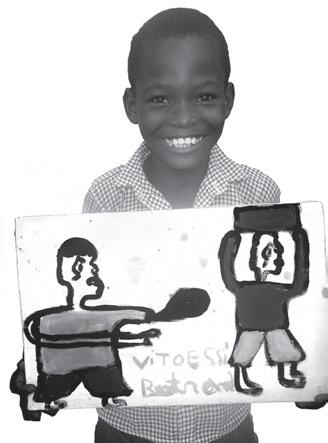
2 minute read
WCP in school subjects
WCP IN SCHOOL
Every year, the WCP Program, is used in classrooms, in many different subjects from maths to social sciences, music and art. The Globe’s reallife stories make the lessons feel more meaningful.
LANGUAGE
The WCP program provides lots of opportunities for reading, writing, speaking and listening and developing critical thinking. The pupils can create essays and plays, fictional stories, presentations and posters, building on the stories in The Globe.
SOCIAL SCIENCES
The heart of the WCP Program is child rights and democracy, issues that are important in all subjects but especially in social sciences and civic education. In the stories about Child Rights Heroes and Ambassadors you will find information about their countries. Some teachers choose to study their countries and regions in more depth. Also look at positive aspects of cultures you are studying, to give a balanced and respectful view of each country and its people.
ARTS
The program gives lots of opportunities for creating art: posters, presentations and media of all sorts.
MATHEMATICS
Understand the world through numbers and statistics, for example in the fact sheet about children in your country and p. 14–15 in The Globe. These indicate how your country and the whole world are living up to the UN Convention on the Rights of the Child and what is being done to achieve the Global Goals for Sustainable Development.
SCIENCE
Explore how science has an impact on us both positively and negatively, and what solutions are available for the world’s most pressing challenges, for example, access to food and clean water, climate change, energy sources, housing and health. The No Litter Generation section includes stories and facts linked to the environment and climate change.
SPORT AND HEALTH
In The Globe and online there are stories and facts about games, sport and health from every part of the world. Global health challenges are highlighted, for example, the impact on the health of young girls caused by them not having the same right to play, leisure time and health care as boys. The Round the Globe Run for a Better World is an opportunity for your pupils to get physically active.
CORPORAL PUNISHMENT
Every year, children in The Globe tell stories of being beaten at school and at home. Despite the fact that corporal punishment is a violation of children’s rights, only 58 countries in the world have banned all forms of physical punishment for children. Article 19 of the UN Convention on the Rights of the Child says that all children have the right to protection from all forms of violence, neglect, mistreatment and abuse. Despite this, every year 40 million children are beaten so badly that they need medical care. Ask your pupils to discuss corporal punishment, taking the children’s stories in The Globe and their own experiences as a starting point. Talk about how things are in your country. Is there a law against beating children? Ask the pupils to think about how they will treat children once they are adults.








